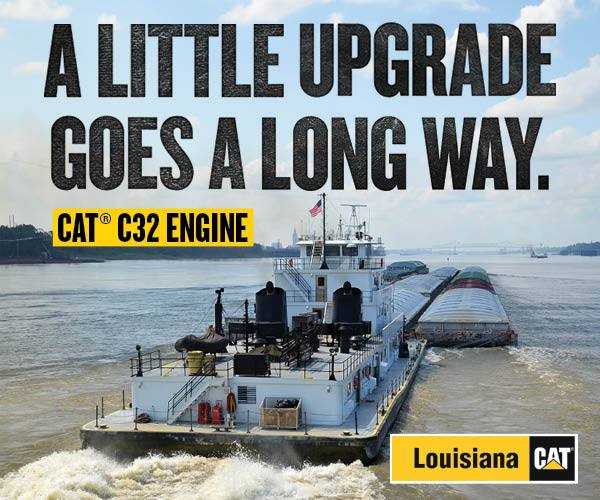Washington, D.C.—Lawmakers are returning to the Capitol for the second session of the 118th Congress with the clock already ticking on a loaded agenda that includes items important to the waterways industry.
Within days, they must deal with the first of two deadlines to keep federal agencies open.
Funding for energy and water programs, including the U.S. Army Corps of Engineers and transportation programs, including the Maritime Administration, will expire on January 19 if a budget agreement is not reached.
Funding for other government programs runs out on the second deadline of February 2.
Senate Majority Leader Chuck Schumer (D-N.Y.) told reporters that negotiators were making progress on reaching a budget deal.
Members of the industry also are tracking the Water Resources Development Act (WRDA) of 2024.
Both chambers could have draft bills available in the spring with floor votes by early summer, a conference committee to work out differences by late summer and a vote on a final bill before the November election, according to the National Waterways Conference.
MarAd, AAPA Port Survey
The Maritime Administration (MarAd) and the American Association of Port Authorities (AAPA) announced a survey of port authorities and marine terminal operators to identify the national port cargo-handling needs over the next five to 10 years.
MarAd and AAPA stated that through interviews with ports and U.S. manufacturers, the effort also will assess the interest and capability of American and foreign manufacturers to produce cargo-handling equipment and other relevant port equipment in the U.S.
They added that the project will assess the feasibility of a pooled procurement model for sourcing electrically powered port equipment and port items.
“Given the shortage of American (or U.S.) manufactured equipment to handle cargo and the industry-led push to electrify operations in response to a changing climate, it is critical that the U.S. build a domestic capacity for manufacturing clean, electrically powered American cargo-handling equipment as an alternative to existing, predominantly foreign sources,” MarAd and AAPA said.
Led by AAPA through a cooperative agreement with MarAd, the Building American Production Capacity for Electric Port Equipment and Other Port Infrastructure Items information collection effort is scheduled to be completed by spring, and a final report issued this summer.
Transforming Transportation
The Department of Transportation (DOT) announced the launch of the Transforming Transportation Advisory Committee (TTAC) to help shape the federal government’s approach to transportation innovation.
TTAC’s initial meeting is scheduled to be held at 9 a.m. Eastern on January 18.
DOT stated that the 27-member committee is to meet at its headquarters in Washington, D.C., with the meeting available online at www.transportation.gov/ttac.
Members of the public also may submit written materials, questions and comments by January 11.
For additional information, contact Vincent White Jr. at 202-770-8887 or ttac@dot.gov.
TTAC’s members include experts from academia, think tanks, the public sector, labor and industry covering topics including automation, cybersecurity, safety, accessibility, law, government, entrepreneurship, privacy and equity.
Towing Vessel User Fees
The Coast Guard published a final rule updating its user fees for seagoing towing vessels that are 300 gross tons or more and revising user fees for other inspected towing vessels.
Effective March 27, the rule is required to establish and maintain a fair fee for its vessel inspection services and to separate the fees for inspection options that involve third-party auditors and surveyors from inspection options that do not involve third parties.
Under the rule, owners and operators of vessels using the Alternate Compliance Program, Streamlined Inspection Program or the Towing Safety Management System options will pay a lower fee than vessels that use the traditional Coast Guard inspection option.
Documents will be available www.regulations.gov under docket number USCG–2018– 0538.
For additional information, contact Jennifer Hnatow at 202-372-1216 or Jennifer.L.Hnatow@uscg.mil.
Chemical Transportation Committee
The National Chemical Transportation Safety Advisory Committee has scheduled a series of subcommittee meetings January 30-31 in League City, Texas, and a full committee meeting February 1 in Texas City, Texas, to discuss matters relating to the safe and secure marine transportation of hazardous materials.
Traditionally focused on policy work related to the safe transportation of bulk cargoes, the committee has been tasked with addressing a wide range of topics, including reduction of greenhouse gas emissions, safe transportation of lithium batteries and a review of the requirements for hazardous areas on vessels.
All meetings will be open to the public with the subcommittee meetings to be held at INEOS Oligomers USA, 2600 S. Shore Blvd., Suite 400, League City, TX 77573, and the full committee meeting to be at U.S. Coast Guard Marine Safety Unit Texas City, 3101 FM 2004, Texas City, TX 77591.
The subcommittee meetings also will be available by videoconference for those unable to attend in person, but the full committee meeting will be held in person only. The meetings are set to begin at 9 a.m. CST.
Preregistration is required for in-person access to the meeting or to attend the subcommittee meetings by videoconference. Public attendees will be required to pre-register by noon EST on January 16 to be admitted to the meeting. In-person attendance may be capped due to limited space in the meeting venue, and registration will be on a first-come, first-served basis.
Comments should be submitted by January 16 to ensure they can be reviewed by committee members before the meeting.
To pre-register or for information on special accommodations, contact Lt. Ethan Beard at 202-372-1419 or Ethan.T.Beard@uscg.mil as soon as possible.




